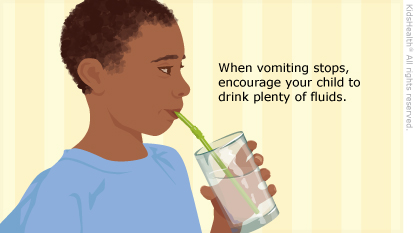Kids with cyclic vomiting syndrome have repeated episodes of severe nausea (feeling sick to the stomach) and vomiting. They may also have belly pain, sweating, and a headache. These episodes usually last for 1–2 days and happen about once a month. In between the episodes, the child has no symptoms.
Cyclic vomiting syndrome can be triggered by (set off by) things like excitement, stress, infections, certain foods, or not getting enough sleep.
Treatment usually includes avoiding triggers, making changes in everyday habits, preventing dehydration (not enough water in the body) during episodes, and sometimes medicine. In most kids, cyclic vomiting syndrome gets better by the early teen years.



Your child:


What causes cyclic vomiting syndrome? It's not clear what causes cyclic vomiting syndrome, but it's likely from a combination of different things. Problems in how the brain interacts with the gastrointestinal tract or how certain cells work, hormonal changes with menstruation, food allergies, or frequent marijuana use are all possible causes. People who have migraines are more likely to have cyclic vomiting syndrome, so these two conditions may be related. Also, the condition can run in families, so there may be a genetic (inherited) cause.
What other treatment is sometimes needed for cyclic vomiting syndrome? Sometimes if the vomiting is very severe or lasts a long time, kids need to go to the hospital for intravenous (IV) fluids. The IV fluids prevent dehydration. The health care provider may also give medicine through the IV to help stop the vomiting.